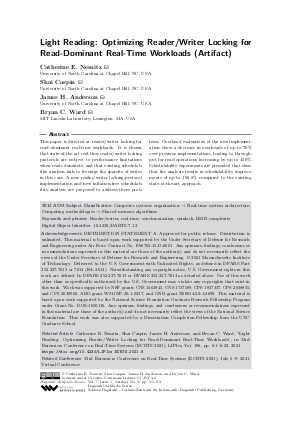Light Reading: Optimizing Reader/Writer Locking for Read-Dominant Real-Time Workloads (Artifact)
Authors Catherine E. Nemitz, Shai Caspin, James H. Anderson, Bryan C. Ward
-
Part of:
Issue:
Special Issue of the 33rd Euromicro Conference on Real-Time Systems (ECRTS 2021)
Part of: Volume: DARTS, Volume 7 (ECOOP 2021)
Part of: Conference: Euromicro Conference on Real-Time Systems (ECRTS)
Part of: Journal: Dagstuhl Artifacts Series (DARTS) - License:
 Creative Commons Attribution 4.0 International license
Creative Commons Attribution 4.0 International license
- Publication Date: 2021-06-30
Artifact Description

PDF
DARTS.7.1.3.pdf
- Filesize: 402 kB
- 3 pages
Document Identifiers
Subject Classification
ACM Subject Classification
- Computer systems organization → Real-time system architecture
- Computing methodologies → Shared memory algorithms
Keywords
- Reader/writer
- real-time
- synchronization
- spinlock
- RMR complexity
Metrics
- Access Statistics
-
Total Accesses (updated on a weekly basis)
0Document
0Metadata
Artifact
DARTS-7-1-3-artifact-640c645393830f61d89f183bfa328079.tgz
(Filesize: 2.2 MB)
MD5 Sum:
640c645393830f61d89f183bfa328079
(Get MD5 Sum)
Abstract
This paper is directed at reader/writer locking for read-dominant real-time workloads. It is shown that state-of-the-art real-time reader/writer locking protocols are subject to performance limitations when reads dominate, and that existing schedulability analysis fails to leverage the sparsity of writes in this case. A new reader/writer locking-protocol implementation and new inflation-free schedulability analysis are proposed to address these problems. Overhead evaluations of the new implementation show a decrease in overheads of up to 70% over previous implementations, leading to throughput for read operations increasing by up to 450%. Schedulability experiments are presented that show that the analysis results in schedulability improvements of up to 156.8% compared to the existing state-of-the-art approach.
Cite As Get BibTex
Catherine E. Nemitz, Shai Caspin, James H. Anderson, and Bryan C. Ward. Light Reading: Optimizing Reader/Writer Locking for Read-Dominant Real-Time Workloads (Artifact). In Special Issue of the 33rd Euromicro Conference on Real-Time Systems (ECRTS 2021). Dagstuhl Artifacts Series (DARTS), Volume 7, Issue 1, pp. 3:1-3:3, Schloss Dagstuhl – Leibniz-Zentrum für Informatik (2021)
https://doi.org/10.4230/DARTS.7.1.3
BibTex
@Article{nemitz_et_al:DARTS.7.1.3,
author = {Nemitz, Catherine E. and Caspin, Shai and Anderson, James H. and Ward, Bryan C.},
title = {{Light Reading: Optimizing Reader/Writer Locking for Read-Dominant Real-Time Workloads (Artifact)}},
pages = {3:1--3:3},
journal = {Dagstuhl Artifacts Series},
ISSN = {2509-8195},
year = {2021},
volume = {7},
number = {1},
editor = {Nemitz, Catherine E. and Caspin, Shai and Anderson, James H. and Ward, Bryan C.},
publisher = {Schloss Dagstuhl -- Leibniz-Zentrum f{\"u}r Informatik},
address = {Dagstuhl, Germany},
URL = {https://drops.dagstuhl.de/entities/document/10.4230/DARTS.7.1.3},
URN = {urn:nbn:de:0030-drops-139828},
doi = {10.4230/DARTS.7.1.3},
annote = {Keywords: Reader/writer, real-time, synchronization, spinlock, RMR complexity}
}
Author Details
Acknowledgements
DISTRIBUTION STATEMENT A. Approved for public release. Distribution is unlimited. This material is based upon work supported by the Under Secretary of Defense for Research and Engineering under Air Force Contract No. FA8702-15-D-0001. Any opinions, findings, conclusions or recommendations expressed in this material are those of the author(s) and do not necessarily reflect the views of the Under Secretary of Defense for Research and Engineering. © 2021 Massachusetts Institute of Technology. Delivered to the U.S. Government with Unlimited Rights, as defined in DFARS Part 252.227-7013 or 7014 (Feb 2014). Notwithstanding any copyright notice, U.S. Government rights in this work are defined by DFARS 252.227-7013 or DFARS 252.227-7014 as detailed above. Use of this work other than as specifically authorized by the U.S. Government may violate any copyrights that exist in this work. Work was supported by NSF grants CNS 1563845, CNS 1717589, CPS 1837337, CPS 2038855, and CPS 2038960, ARO grant W911NF-20-1-0237, and ONR grant N00014-20-1-2698. This material is based upon work supported by the National Science Foundation Graduate Research Fellowship Program under Grant No. DGS-1650116. Any opinions, findings, and conclusions or recommendations expressed in this material are those of the author(s) and do not necessarily reflect the views of the National Science Foundation. This work was also supported by a Dissertation Completion Fellowship from the UNC Graduate School.
Related Article
- Catherine E. Nemitz, Shai Caspin, James H. Anderson, and Bryan C. Ward, "Light Reading: Optimizing Reader/Writer Locking for Read-Dominant Real-Time Workloads", in 33rd Euromicro Conference on Real-Time Systems (ECRTS 2021), LIPIcs, Vol. 196, pp. 6:1-6:22, 2021. https://doi.org/10.4230/LIPIcs.ECRTS.2021.6
References
- GLPK (GNU Linear Programming Kit). URL: https://www.gnu.org/software/glpk/.
- A. Biondi and B. Brandenburg. Artifact for Lightweight real-time synchronization under P-EDF on symmetric and asymmetric multiprocessors. http://people.mpi-sws.org/~bbb/papers/ae/ecrts16/pedf-synch.html, 2016.
-
A. Biondi and B. Brandenburg. Lightweight real-time synchronization under P-EDF on symmetric and asymmetric multiprocessors. In Proceedings of the 28th Euromicro Conference on Real-Time Systems, 2016.

-
B. Brandenburg. Scheduling and Locking in Multiprocessor Real-Time Operating Systems. PhD thesis, University of North Carolina, Chapel Hill, NC, 2011.

- C. Nemitz, T. Amert, and J. Anderson. Using Lock Servers to Scale Real-Time Locking Protocols: Chasing Ever-Increasing Core Counts (Artifact). Dagstuhl Artifacts Series, 4(2):2:1-2:3, 2018. URL: https://doi.org/10.4230/DARTS.4.2.2.
